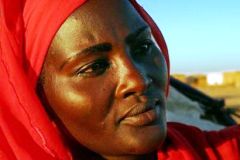Human rights group, aid agencies press UN to curb violence in Darfur
By RODRIQUE NGOWI, Associated Press Writer
NAIROBI, Kenya, Nov 15, 2004 (AP) — The U.N. Security Council , should impose sanctions on Sudanese officials and enforce an arms embargo on pro-government Arab militia behind ethnic cleansing in Sudan’s Darfur region, where a 21-month conflict has left tens of thousands dead and driven 1.8 million people from their homes, a human rights group and aid agencies said Monday.

|
|
Ekhals Abuaker, 26, at Abushouk camp near El Fasher, the capital of North Darfur state, November 13, after fleeing ethnic fighting in the town of Tawilla last week. Abushouk camp in the troubled Darfur region of western Sudan is home to more than 45,000 people driven from their villages by 22 months of fighting in Africa’s largest country, where U.N. officials are currently investigating whether genocide has occured. (Reuters). |
Sudan has failed to disarm and disband the Arab militia responsible for atrocities in Darfur, instead incorporating some Arab fighters into security forces “to ‘guard’ the camps of the very same displaced civilians whom they had originally burned out of their villages,” Human Rights Watch said in a report.
Last week, one of those camps was forcibly dismantled by Sudanese security forces, driving the people who had sought refugee there back into Darfur’s arid countryside.
The report was released three days before the start of a U.N. Security Council special session scheduled to take place in Nairobi, Kenya’s capital, from Nov. 18-19.
“It’s important to understand that ethnic cleansing in Darfur consists first of forcibly displacing people, then preventing them from returning home safely,” said Peter Takirambudde, who heads the Africa Division of the New York-based group. “What we are seeing with these raids and tear-gassing of displaced camps is the government violently relocating people to areas other than their homes.”
Six international aid agencies working in Sudan on Monday said the humanitarian situation is deteriorating in Darfur because fighting has kept aid workers from reaching people in urgent need of assistance.
“Previous U.N. Resolutions on Darfur have amounted to little more than empty threats, with minimal impact on the levels of violence,” said Cynthia Gaigals, speaking for a group of aid organizations that includes CARE International, the International Rescue Committee and Oxfam International.
“The Security Council must now outline specific and time-bound compliance measures and agree to implement them if there is no clear and sustained progress,” Gaigals said.
The United Nations has called Darfur the world’s worst humanitarian crisis, and hardships, including disease and malnutrition, are believed to have killed more than 70,000 of the displaced in Darfur since March. Many more have been killed in fighting since the conflict broke out in February 2003, although no firm estimate of the direct toll of the war yet exists.
U.N. Secretary-General Kofi Annan told the Security Council on Nov. 3 that there are strong indications that war crimes and crimes against humanity were committed “on a large and systematic scale” in Darfur.
But the current Security Council draft resolution does not impose sanctions on Sudan “for its direct participation in the brutal ethnic cleansing of Darfur’s civilians,” the New York-based rights group said.
On July 30, the Security Council imposed an arms embargo on rebels and the pro-government Arab militia, known as the Janjaweed. The U.N. also ordered a freeze of assets held by the Arab militia and imposed a travel ban on their leaders.
“But the Janjaweed don’t travel and they don’t have assets abroad” and no sanction committee has been set up by the United Nations, Human Rights Watch’s Jemera Rone told reporters. “The Sudanese government continue to supply them with weapons and back their attacks with helicopter gunships.”
The Security Council should extend an arms embargo to the Sudanese government and impose travel sanctions and asset freezes on key government and military officials, Human Right Watch said.
It should also ensure displaced people can return safely return home provide reparations — possibly from oil revenues — to victims of government forces or militias, the organization said.
Darfur’s violence began in February 2003, when Sudan’s Arab-dominated government was accused of unleashing Arab tribal militias against the region’s non-Arab African farmers after attacks by two newly emerged rebel groups.
Sudanese warplanes are accused of backing the so-called Janjaweed militia in simultaneous raids. Sudan denies the accusation.
___
On the Net: http://hrw.org/backgrounder/africa/darfur1104/
